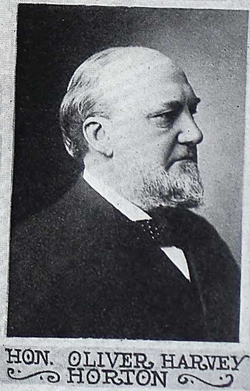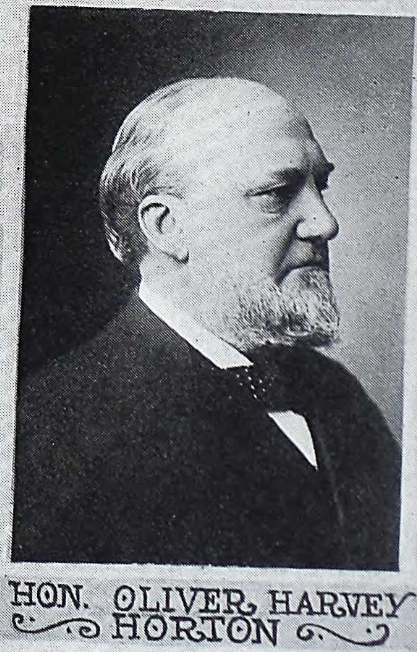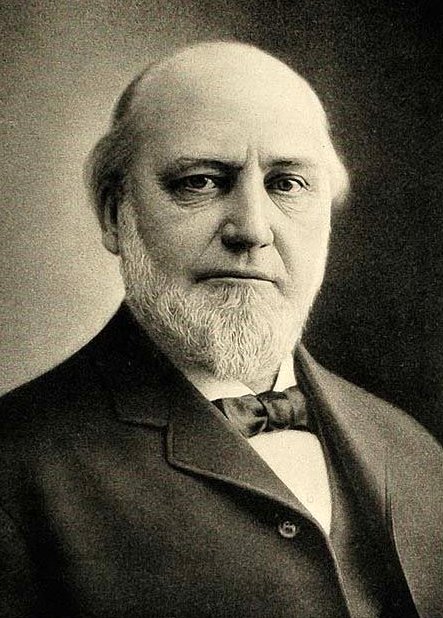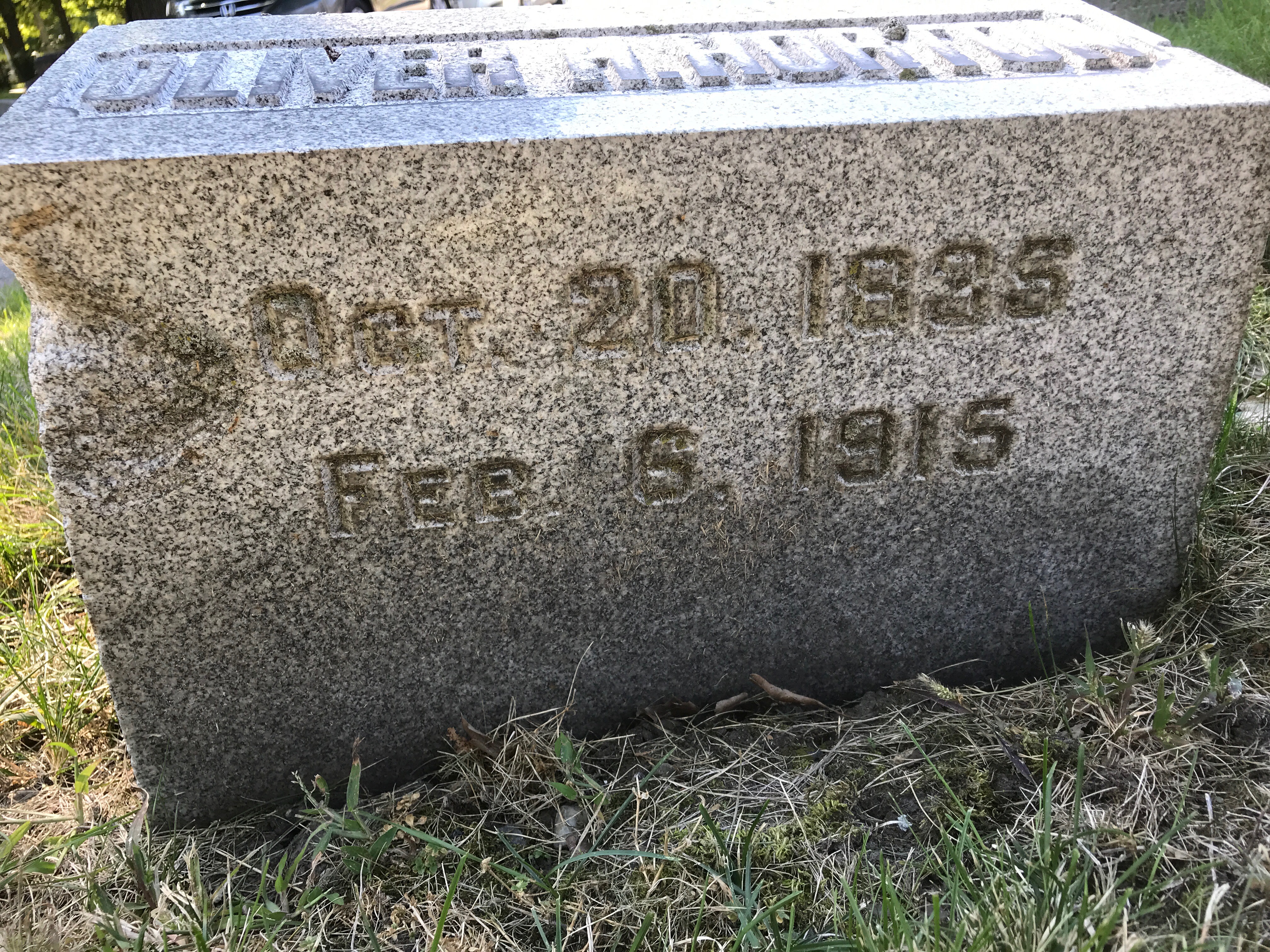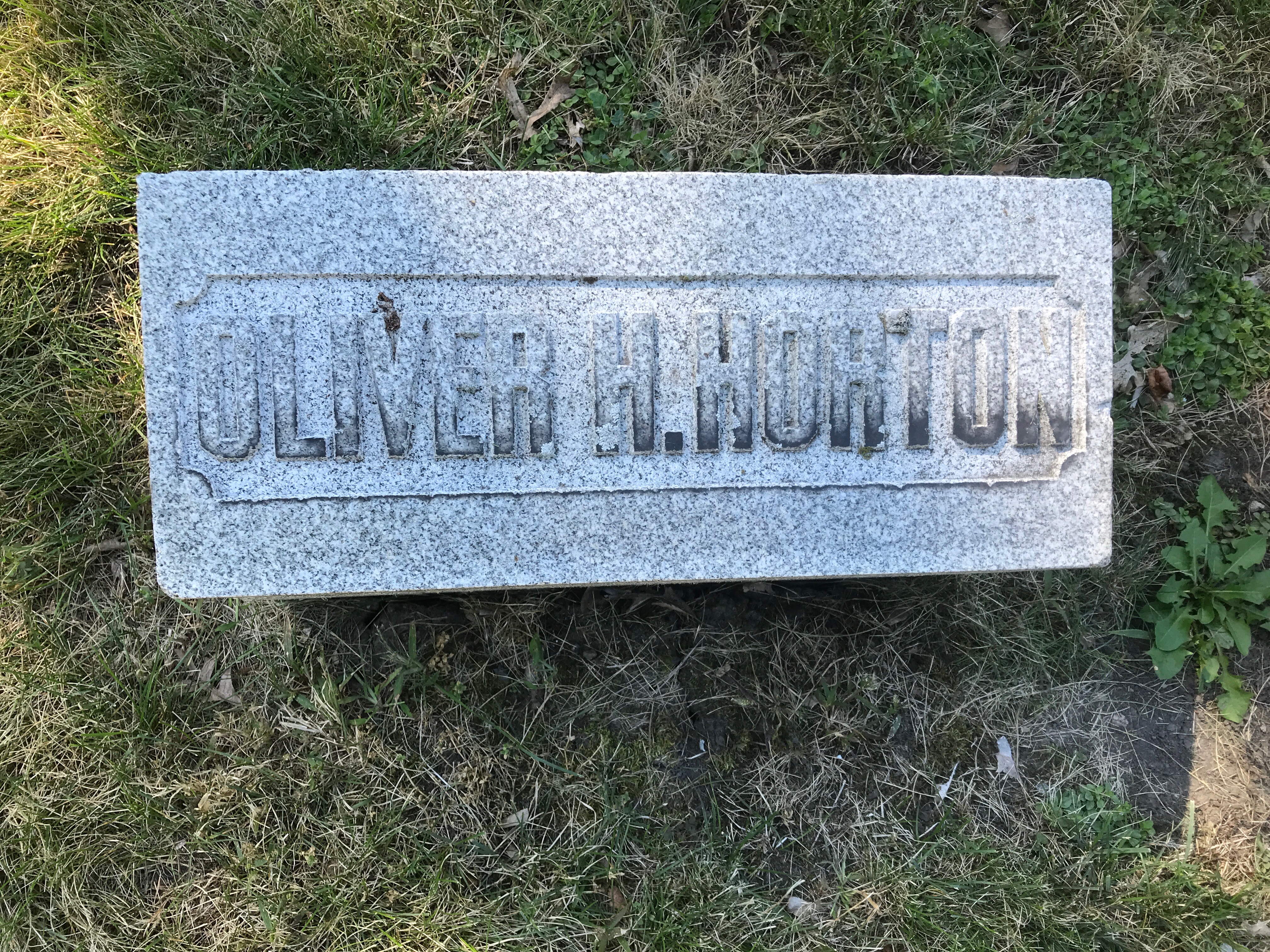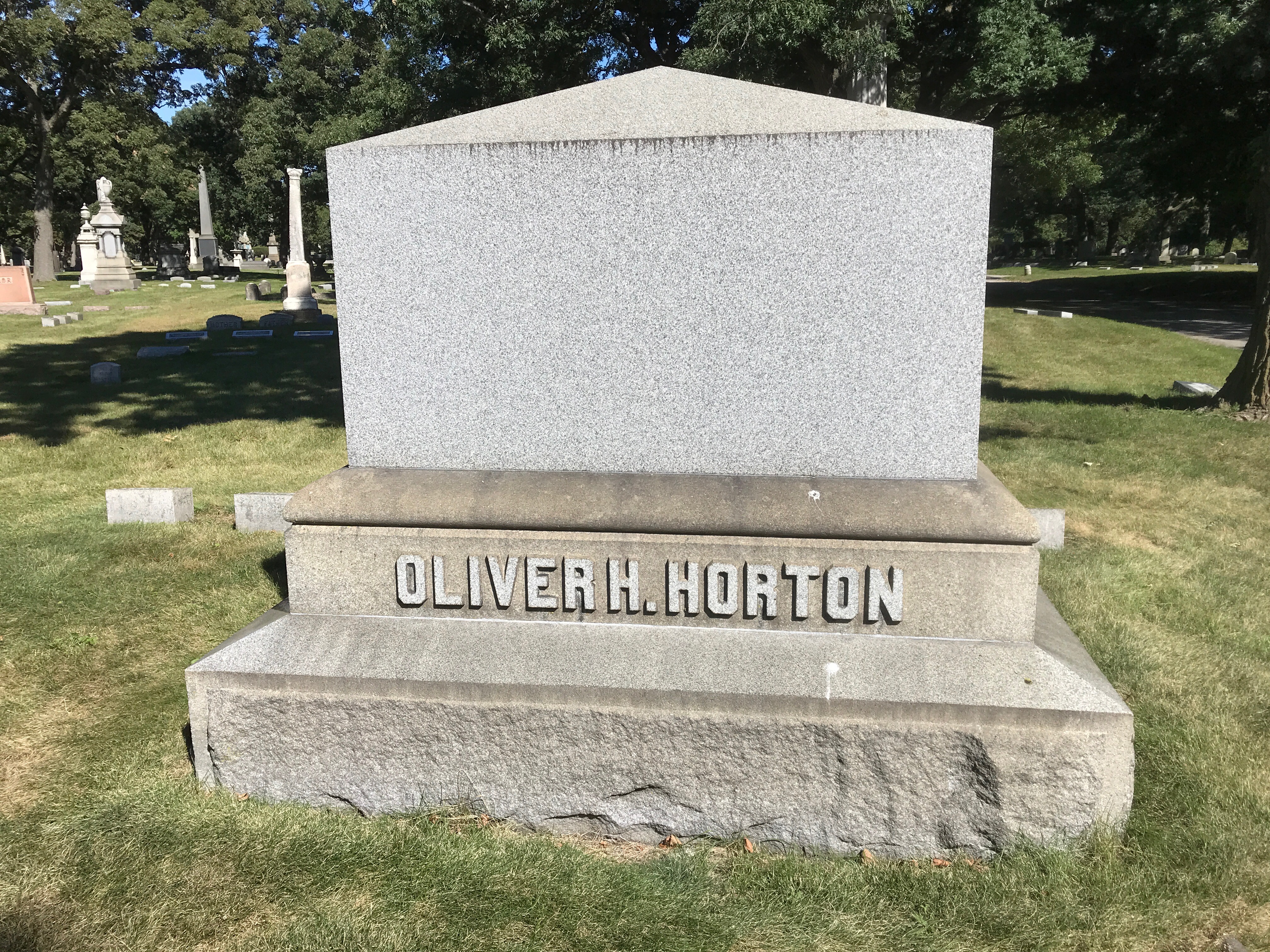Hon. Oliver H. Horton. Among the many factors which combine to form that body which we call "the state," there is none more indispensable to its growth,prosperity and permanence than that particular factor which we know as jurisprudence. The very cornerstone of a stable government, and that about which center the great forces of civilization, it affords, of all professions,the grandest opportunities for the development of one's ability and for the subsequent advancement to positions of sacred trust. Whether considered as a citizen, as a lawyer, or as a jurist, the life of Judge Horton is an example of what may be accomplished by the exercise of the sterling qualities of perseverance and integrity and the cultivation of one's higher sensibilities.
Born in Cattaraugus County, New York, October 20, 1835, the son of Henry W. and Mary Horton,he came to Chicago at the age of twenty and found employment in the lumber business. It was not until some five years later, at an age when the young man of today considers himself unfortunate if he is not fairly well established in business, that young Horton entered the law, office of Hoyne,Miller & Lewis and served
in the several capacities of office attendant, student and clerk. He devoted himself closely to his duties, undertaking and successfully pursuing, at the same time, a regular course in the law school of the old Chicago University, from which he was graduated with the class of 1863. His diligent study, however, had enabled him to pass the examination for admittance to the bar some little time previous to this, and when, in the early part of 1864, the firm of Hoyne, Miller & Lewis was dissolved, a new partnership was formed by
the late Hon. Thomas Hoyne, Benjamin F. Aver and Mr. Horton, in which Mr. Horton's name appeared as junior member, Mr. Aver withdrew the following year and the firm of Hoyne & Horton was organized, the name being changed again in 1867 to that of Hoyne, Horton & Hoyne. and thus it remained until the death of Mr. Hoyne, the senior partner, in 1883. From then until 1887, when Mr. Horton went on the bench, it was known as Horton & Hoyne. It is of interest to
note, and it is a fact in which Judge Horton takes a just amount of pride, that he began reading law in the same office and in a building which stood on the same lot, from which just twenty-seven years and five days later he was to leave as a senior partner to accept the responsible judicial trust to which he had been elected.
Judge Horton received his first judicial nomination to the Cook County Circuit Court in 1887 by a vote of the members of the bar, at which ninety per cent of the ballots were in his favor. Although a Republican in his affiliations, he was a candidate on the non-partisan ticket in the election which followed. In the twice that he has been renominated, however, his name has appeared on both Republican and Democratic tickets, a fact which shows the esteem in which he is held by the bar and by the public generally, and in March, 1898, be was selected as a judge of the Appellate Court of the First District, a legal honor of considerable magnitude, and which further indicates the respect with which he is regarded by the bench.
Since entering upon his duties as a jurist, Judge Horton has been a most active and earnest worker. Probably in the same length of time no other judge in the state has ever become better known through the wisdom of his decisions and rulings. Possessing a clear conception of the spirit and scope of jurisprudence, he is also endowed with an intuitive perception between right and wrong, which almost amounts to inspiration.
Judge Horton is not a politician and has held but one public office, and in that instance, as he says, "only
because there was no help for it." This was the position of corporation counsel, to which Mayor Roche nominated him without his knowledge and while he was absent from the city. Notwithstanding that he withdrew his name as soon as he heard of it, the nomi-nation was confirmed by the unanimous vote of the common council, and, under these conditions he finally decided to accept. It was only a matter of some two months, however, after this that he was released from these duties, which came to him so unsolicited, by his nomination to the bench.
In social and professional circles Judge Horton has taken a prominent place. He has been a member of the Union League Club since its organization, and is identified with the Chicago Literary Club, the Marquette Club, the Hamilton Club, the Forty Club, the Chicago Athletic Club, the Veteran Union League and the Glen View Golf Club. He is a member of the Bar Association; was for years an active member of the Law Institute; served several terms as its treasurer and afterward as president. He has served as president of the Union College of Law and of its Alumni Association, was a charter member and was president of the Medico-Legal Society, is now one of the five trustees of the Lewis Institute, and has been for many years a trustee,
and is now first vice-president, of the Northwestern
University. He is a trustee of the Garrett Biblical Institute and a devoted member of the Methodist Episcopal
Church, having held every official position therein to which a layman is eligible. In 1880 he was sent as
a delegate to the general conference of that denomination, which met in Cincinnati, and the year following was elected a lay delegate to the ecumenical conference which met in London: He is president of the Rock River M. E. Layman's Association, which originated the resolutions making equal lay representation in the M. E. General Conference. He has been a member and a trustee of the Grace, and afterward Trinity, M. E. Church for many years.
Judge Horton's wife was Miss Frances B. Gould, a daughter of Philip N. Gould. one of Chicago's pioneer residents. They have had two children, neither of whom are now living.
Hon. Oliver H. Horton. Among the many factors which combine to form that body which we call "the state," there is none more indispensable to its growth,prosperity and permanence than that particular factor which we know as jurisprudence. The very cornerstone of a stable government, and that about which center the great forces of civilization, it affords, of all professions,the grandest opportunities for the development of one's ability and for the subsequent advancement to positions of sacred trust. Whether considered as a citizen, as a lawyer, or as a jurist, the life of Judge Horton is an example of what may be accomplished by the exercise of the sterling qualities of perseverance and integrity and the cultivation of one's higher sensibilities.
Born in Cattaraugus County, New York, October 20, 1835, the son of Henry W. and Mary Horton,he came to Chicago at the age of twenty and found employment in the lumber business. It was not until some five years later, at an age when the young man of today considers himself unfortunate if he is not fairly well established in business, that young Horton entered the law, office of Hoyne,Miller & Lewis and served
in the several capacities of office attendant, student and clerk. He devoted himself closely to his duties, undertaking and successfully pursuing, at the same time, a regular course in the law school of the old Chicago University, from which he was graduated with the class of 1863. His diligent study, however, had enabled him to pass the examination for admittance to the bar some little time previous to this, and when, in the early part of 1864, the firm of Hoyne, Miller & Lewis was dissolved, a new partnership was formed by
the late Hon. Thomas Hoyne, Benjamin F. Aver and Mr. Horton, in which Mr. Horton's name appeared as junior member, Mr. Aver withdrew the following year and the firm of Hoyne & Horton was organized, the name being changed again in 1867 to that of Hoyne, Horton & Hoyne. and thus it remained until the death of Mr. Hoyne, the senior partner, in 1883. From then until 1887, when Mr. Horton went on the bench, it was known as Horton & Hoyne. It is of interest to
note, and it is a fact in which Judge Horton takes a just amount of pride, that he began reading law in the same office and in a building which stood on the same lot, from which just twenty-seven years and five days later he was to leave as a senior partner to accept the responsible judicial trust to which he had been elected.
Judge Horton received his first judicial nomination to the Cook County Circuit Court in 1887 by a vote of the members of the bar, at which ninety per cent of the ballots were in his favor. Although a Republican in his affiliations, he was a candidate on the non-partisan ticket in the election which followed. In the twice that he has been renominated, however, his name has appeared on both Republican and Democratic tickets, a fact which shows the esteem in which he is held by the bar and by the public generally, and in March, 1898, be was selected as a judge of the Appellate Court of the First District, a legal honor of considerable magnitude, and which further indicates the respect with which he is regarded by the bench.
Since entering upon his duties as a jurist, Judge Horton has been a most active and earnest worker. Probably in the same length of time no other judge in the state has ever become better known through the wisdom of his decisions and rulings. Possessing a clear conception of the spirit and scope of jurisprudence, he is also endowed with an intuitive perception between right and wrong, which almost amounts to inspiration.
Judge Horton is not a politician and has held but one public office, and in that instance, as he says, "only
because there was no help for it." This was the position of corporation counsel, to which Mayor Roche nominated him without his knowledge and while he was absent from the city. Notwithstanding that he withdrew his name as soon as he heard of it, the nomi-nation was confirmed by the unanimous vote of the common council, and, under these conditions he finally decided to accept. It was only a matter of some two months, however, after this that he was released from these duties, which came to him so unsolicited, by his nomination to the bench.
In social and professional circles Judge Horton has taken a prominent place. He has been a member of the Union League Club since its organization, and is identified with the Chicago Literary Club, the Marquette Club, the Hamilton Club, the Forty Club, the Chicago Athletic Club, the Veteran Union League and the Glen View Golf Club. He is a member of the Bar Association; was for years an active member of the Law Institute; served several terms as its treasurer and afterward as president. He has served as president of the Union College of Law and of its Alumni Association, was a charter member and was president of the Medico-Legal Society, is now one of the five trustees of the Lewis Institute, and has been for many years a trustee,
and is now first vice-president, of the Northwestern
University. He is a trustee of the Garrett Biblical Institute and a devoted member of the Methodist Episcopal
Church, having held every official position therein to which a layman is eligible. In 1880 he was sent as
a delegate to the general conference of that denomination, which met in Cincinnati, and the year following was elected a lay delegate to the ecumenical conference which met in London: He is president of the Rock River M. E. Layman's Association, which originated the resolutions making equal lay representation in the M. E. General Conference. He has been a member and a trustee of the Grace, and afterward Trinity, M. E. Church for many years.
Judge Horton's wife was Miss Frances B. Gould, a daughter of Philip N. Gould. one of Chicago's pioneer residents. They have had two children, neither of whom are now living.
Family Members
Sponsored by Ancestry
Advertisement
Advertisement
